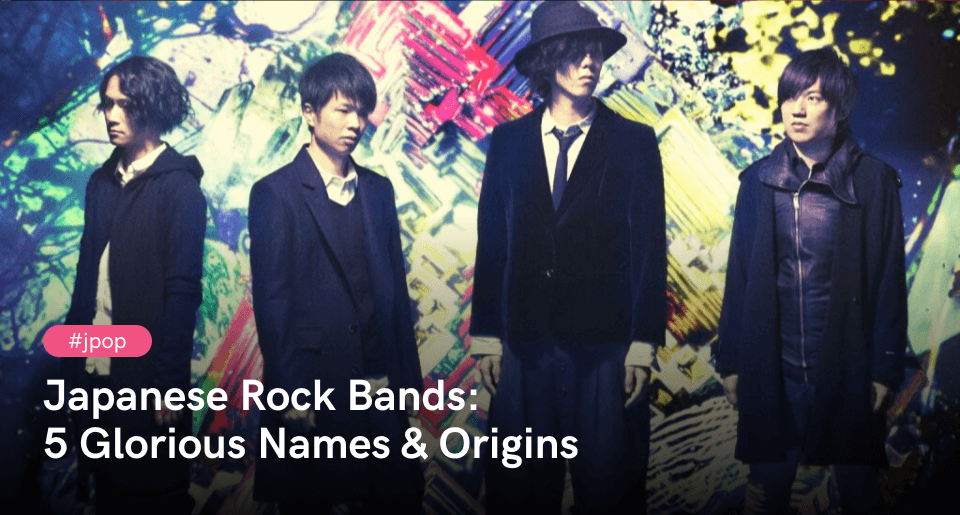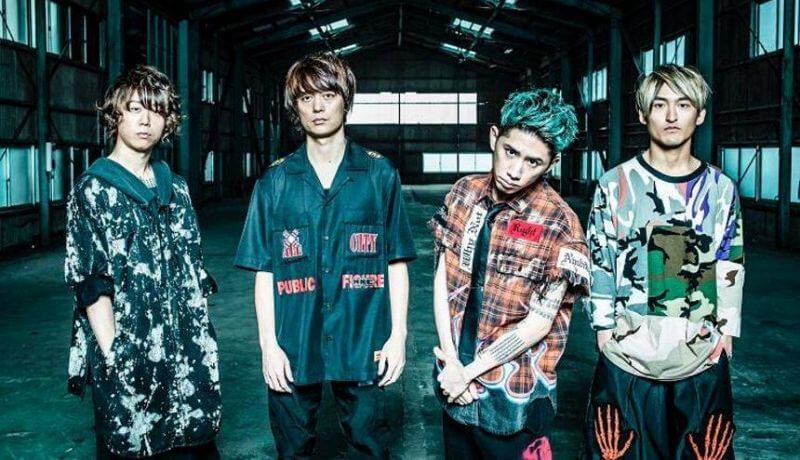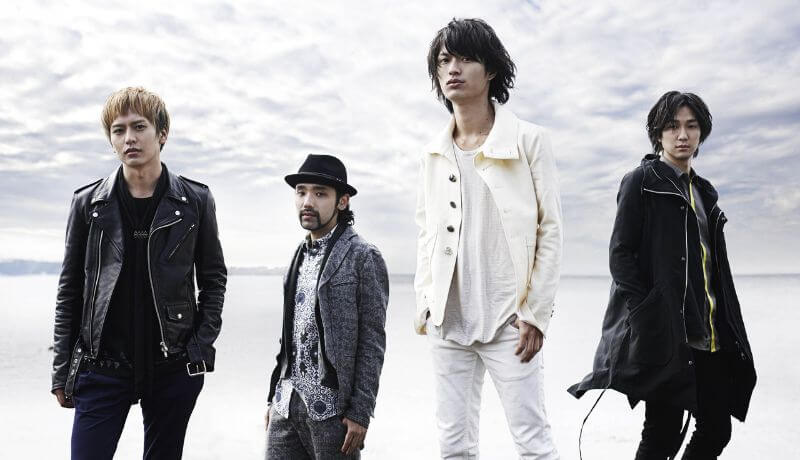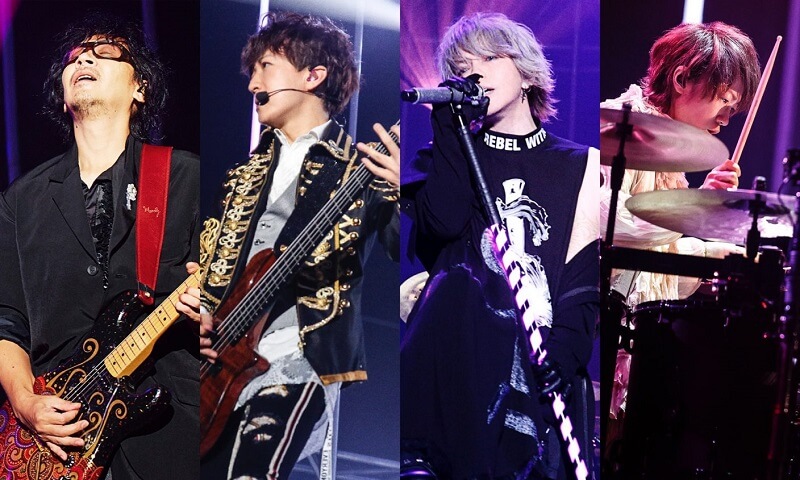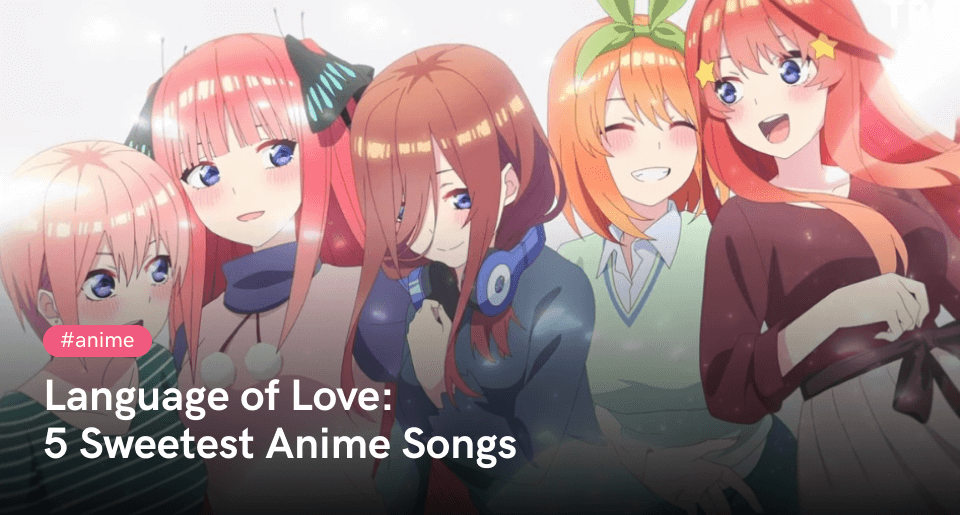Japan is the world’s second-biggest market for recorded music, full to the brim with countless artists, styles, and genres.
Of course, Japan also has its fair share of glorious artist names -- from clever choices like Hilcrhyme (a hip-hop act that is a play on the phrase "hill climb") to offbeat yet intriguing ones like My Hair is Bad.
Ever wondered how artists come up with these awesome names?
You're about to find out!
In this blog post, you'll:
- Learn how bands decide on a name for themselves
- Discover the naming origins of 5 popular Japanese rock bands
- Find out which songs of theirs you'll want to check out first
Ready to begin? Let's get this show on the road!
Contents
How do bands come up with their names?
Your band's name is one of the standards by which the public will judge you, both on a professional and personal level. After all, while you can easily put together a clean radio edit of even your most hard-hitting, expletive-laden tune and still get your music out to the world, how do you sugarcoat your group's name itself? Presumably there'd be much more red tape involved.
Here's a few quick points that any band will want to keep in mind when picking a name, courtesy of real advice from 30 actual bands:
Make sure the name doesn't exist yet
Check the potential name on Google, Spotify, Wikipedia, SoundCloud, and other online services to make sure nobody else has already called shotgun on it; you'll want your group to come up first (or exclusively) when people search for it. That goes for similar alternatives to -- it can be easy to confuse Everlast and Everclear, for example (even though they're two completely different types of artists).
Talk the name over with your bandmates
A band is a collaborative endeavor by nature, so you'll want to be able to freely bounce ideas off your fellow members. If everyone isn't on the same page about the name you all eventually decide on, just being in the band can easily feel like a chore -- or worse, a prison.
Pick a name that resonates with you all
If you're all from Australia, for example, try naming your group after something that is decidedly Australian -- a famous street, a local delicacy, or even a popular hangout.
The advantage of picking a name that all members can identify with is, of course, that it can bring you all closer together. And a cohesive, well-oiled musical unit can only mean one thing: better awesome rock melodies for your fanbase!
Choose a name that's easy
It stands to reason that the more accessible your name is in everyday situations, the more readily people will spread the word.
There are several kinds of "easy" you'll want to pay attention to:
- Easy to remember
- Easy to pronounce
- Easy to understand
- Easy to read
- Easy to write
You could be churning out the catchiest tunes in the world, but if your band's name is something like Supercalifragilisticexpialidocious, you're only limiting your own potential.
Clear these accessibility hurdles and you should be good to go. Even if your group's name is an unconventional combination of words (as is often the case with Japanese rock bands)!
#1: ONE OK ROCK
As heard in
Rurouni Kenshin
Years active
2005 - present
Recommended songs
Glorious band name origins
Though the English spelling makes it seem like you need to pronounce this band's name "one okay rock," it's actually much simpler: "one oh clock." Yes, just like the hour of the day -- 1 o'clock.
The name hits very close to home for the band members, as they would often rent out a rehearsal studio at 1 AM on the weekend (when prices are much cheaper).
Taka, ONE OK ROCK vocalist, had this to say about the band's name: "1 o'clock, or ONE OK ROCK, will always be where it all began for us."
Band info
One of ONE OK ROCK's most notable characteristics is the large number of songs in its catalogue that feature amazing English lyrics and pronunciation -- either partially or in full.
Though no doubt the band's world tours and international music festival appearances have helped shaped this global direction, the reality is that Taka and his fellow members were always fans of Western artists. Taka, in particular, cites Linkin Park, Good Charlotte, and Simple Plan as some of his biggest musical influences.
By his own admission Taka isn't fluent in English per se -- he's just got a good ear, which helps his pronunciation. Plus, there were lots of overseas returnees at his school, so you can imagine the degree to which English became a part of his life while growing up.
Featured song
To witness just how seamlessly Taka blends English and Japanese in ONE OK ROCK's songs, give the slow ballad Heartache a listen.
A simple yet powerful ode to love lost that is carried by Taka's pained vocals and heartfelt lyrics, it's no wonder the live rendition below had the whole audience captivated (and many people reaching for their handkerchiefs).
Do pay attention to the way Taka flawlessly sings the word "heartache" in the chorus. Rather than rely on the standard Japanese pronunciation -- which would distinguish the two elements and give something akin to haato-eiku -- he adopts a native English style that results in a D sound. This effort makes the track that much more effective, as the perfect pronunciation really drives the message -- and the emotion behind it -- home.
#2: NICO Touches The Walls
As heard in
Haikyuu!!, Full Metal Alchemist, Naruto
Years active
2004 - 2019
Recommended songs
Glorious name origins
Lead singer and guitarist Tatsuya Mitsumura provided the eponymous wall-touching for this popular Japanese rock band.
Mitsumura lost his footing while inside a rehearsal studio restroom, placed his hand on the nearby wall to steady himself, and had an epiphany: He realized that walls represent the obstacles in life, and that he and his band wanted to overcome those obstacles in order to discover the world that lies beyond.
As for NICO?
The band members simply wanted to include the name of a foreign (or foreign-sounding?) woman because it had a nice ring to it!
Band info
NICO Touches The Walls made an immediate impact when it burst onto the music scene, taking home the grand prize at the Yamaha Teen Music Festival in the very same year it debuted.
Guitarist and lead singer Tatsuya Mitsumura pulled double duties as songwriter and lyricist, and for that reason alone was one of the core pillars of the band. He has a distinct twang to his voice that's somewhat akin to Kazutoshi Sakurai of Mr. Children (another legendary Japanese rock band), albeit a little deeper and more full-bodied. That made him the perfect frontman for the band and its energetic numbers, like our featured song below.
NICO Touches The Walls disbanded in 2019, with its members citing their desire “to see some new scenery” as the reason for going their separate ways. After 15 years on the road and in recording studios together, that's as good a reason as any -- and we wish them all the best in their future endeavors.
Featured song
Te wo Tatake is a bopping summer tune from 2011 that combines catchy verses with a sweeping chorus, fun clapping, and the blasting of horns in the background.
Check out an example of the track's curious yet colorful lyrics (and their English translation) below. They may not make much sense on paper, but that musical ridiculousness is exactly what helps put a smile on your face!
Ushinatta yume wo torimodosu tame ni
Nakittsura ni MAYONNAISE
Take back those dreams you've lost
By throwing mayonnaise over that sad face
The mayonnaise reference is a play on the phrase nakittsura ni hachi, which refers to separate bad things happening one after the other -- basically, the Japanese equivalent of "when it rains it pours." By replacing hachi (bee) with salad dressing, it's almost as if NICO is telling you to just laugh off the bad times in whatever ridiculous way you can, and push forward!
#3: RADWIMPS
As heard in
Your Name, Weathering With You
Years active
2001 - present
Recommended songs
Glorious band name origins
”Rad" and "wimp" -- two words you'll rarely hear uttered in the same breath.
Not that the combination works against the band in any way, though. If anything, it's the opposite: the “excellent weaklings” or “superlative cowards” vibe actually gives you the impression that these guys are something truly special. Talk about the sum being greater than its parts!
One website specializing in naming origins goes even deeper in its analysis: it explains that the RADWIMPS name was a natural choice, given that humans and the world around them are at their core a combination of polar opposites anyway. With dichotomies like hot and cold, light and dark, and happy and sad shaping how we live our lives, it's an argument you can't help but accept.
Band info
RADWIMPS gained international popularity when it provided music for two consecutive anime movies from acclaimed director Makoto Shinkai: Your Name in 2016, and Weathering With You in 2019.
Like Taka from ONE OK ROCK above, songwriter and vocalist Yojiro Noda inserts plenty of English lyrics into RADWIMPS' work (especially its earlier catalogue) -- with pronunciation that's pretty much perfect to boot too. In fact, both two bands have even collaborated on a number of occasions on stage and in the studio, so they must be a good match! (Check out their duet on the RADWIMPS ballad By My Side, for example, to see them in action.)
While most of the other Japanese rock bands in this list boast raw, powerful vocals, there's a certain clarity and gentleness in Noda's singing style that lends itself well to ballads and more casual listening.
Still, that's not to say he can't get an entire stadium up on its feet. Give our featured song below a listen and see for yourself!
Featured song
Banzai Sensho is a festive celebration of a song that will appeal to RADWIMPS fans and first-time listeners alike. The title, rather aptly, translates to "One Thousand Banzai Chants" in Japanese.
With its upbeat tempo, inspirational lyrics, soaring vocals, and epic arrangement (including what sounds like bagpipes!), it's definitely one song you'll want to hear live in concert at least once in your life.
The song's name comes from banzai sansho, which is the act of throwing your arms up into the air and shouting "Banzai!" three times. It's often done to give thanks and/or celebrate important achievements, much like "Hip hip hooray!" in English.
Interestingly, the word sensho doesn't technically exist in Japanese. According to Noda, three banzai chants wasn't enough to convey the sentiment behind the song, so he went for a thousand instead. Logic checks out!
#4: L’Arc~en~Ciel
As heard in
GTO, Gundam, Ring 0: Birthday, Osu! Tatakae! Ouendan
Years active
1991- present
Recommended songs
Glorious band name origins
L'arc-en-ciel (lit. "the arch/curve in the sky") is the French word for rainbow. The band's vocalist, Hyde, explained the simple yet understandable reason for the name in a 2012 interview with Forbes:
"[All] the English names were pretty much taken by all the other bands so we decided to go with French. That way it’d be very unique."
In a poetic sort of way, though, the name grew on the band's members. They eventually came to see l'arc-en-ciel as indicative of who they are as musicians, as their works are very diverse -- just like the various colors you'll find in a rainbow itself. You need only take a listen to the group's punk rock alter ego P'unk~en~Ciel, or Hyde's solo project VAMPS, for the scope of this diversity to really sink in.
Band info
L’Arc~en~Ciel has been a household name in Japan since the early 1990s, with more than 40 million records sold and countless venues played both domestically and around the world. (It was even the first Japanese artist to headline at Madison Square Garden!)
The band started out and rose to prominence during a period in the Japanese music industry where so-called visual kei groups were all the rage. As the name suggests, the visual aesthetic of these acts was core to their entire concept and brand: performers would don elaborate outfits with glam, goth, and androgynous influences, and the imagery in their work had an undeniable shock factor to it. (Think KISS and Twisted Sister in the West.)
Though L'Arc~en~Ciel always refused to label itself a visual kei band per se, even going so far as to leave a TV taping early in discontent when referred to as such. But if you look at photos and videos of its early years, the focus on aesthetic is indeed there.
Featured song
One of our favorite tunes from the rock veterans is finale, a slow haunting ballad that accompanies the end credits for Ring 0: Birthday (the prequel to the Ring horror movie series).
The song begins with the slight crackling of Hyde's delicate vocals -- almost as if he were singing from within the very video tape in which Ring's evil spirit Sadako resides -- and gradually swells to a desperate climax, mirroring the rage and spite that Sadako herself has for the world that condemned her.
It's truly riveting stuff (doubly so when performed live, below) and definitely worth a listen!
#5: B'z
As heard in
Umizaru, Detective Boy Conan, Buzzer Beat
Years active: 1988 - present
Recommended songs
Glorious band name origins
It's only fitting that a legendary rock band (you'll read more about that in the section below) would have so many legends surrounding its naming and formation:
- B and Z standing for The Beatles and Led Zeppelin respectively
- B'z simply being a unique rendering of the word "bees"
- Wanting to use a symbol (an apostrophe in this case) because it'd be cool
- Wanting to use Z in some way, shape, or form
One particularly interesting story is that the duo initially went with A'z, to convey the idea that they'd be a universal music act covering everything from A to Z.
By vocalist Koshi Inaba's own admission on music talk show Bokura no Ongaku in 2005, the reason for dropping the A'z idea and going with B'z instead was that "A'z is hard to pronounce." Some sources attribute this difficulty to the similarity between A'z (with a strong A) and AIDS, but our research couldn't produce a definitive answer.
Band info
B'z consists of guitarist Takahiro Matsumoto and vocalist Koshi Inaba, with each member handling music arrangement and lyrics respectively. Though B'z recruits semi-regular support members while recording and on tour, it's technically a two-man unit.
The band has attained legendary status in Japan and around the world, and has a host of accolades to prove it:
- First Asian artist to get a star on the Hollywood Rock Walk (2008)
- Shared the stage with Aerosmith at the FIFA World Cup 2002 concert
- 49 singles in a row that debuted at #1 on Japan's Oricon music charts
What's particularly great about B'z is the variety you'll find in Matsumoto's sound and Inaba's singing style over the years (not surprising, when the group has been around for more than three decades). From hard rock to acoustic ballads, and husky crooning to high-pitched Aerosmith-esque shouts, you're bound to find something you like in the band's catalogue!
Featured song
RED is a rock anthem with purpose.
The band created the belter specifically as the entrance music for Hiroki Kuroda of Hiroshima’s Rakuten Eagles baseball team, which uses the color red in all its team imagery and outfits. (Kuroda, for his part, is a huge B’z fan who requested the song in the first place.)
With its unique mandolin intro, pounding drum beat, chanting background vocals, and pre-guitar-solo “I will fight with my back to the wall” cry from Inaba, it definitely fulfills its goal of hyping up the stadium crowd.
That in itself makes for an instant classic, but here’s the best part: each line of the chorus begins with the letters that make up the word RED itself!
Here’s an example, with an English translation for your reference:
Raku wa shinai
Eraburanai
Dare no sei ni mo shinai
Rei wo tsukushi
Eiga wo sute
Doromamire ni mo narou
Don't cruise through
Don't be pompous
Don't blame others
Be courteous
Forget splendor and luxury
Get used to blood, sweat, and tears
If that's not a rousing war cry of a song, we don't know what is!
What's in a name?
Deciding on a band name is one of the most important milestones in a budding musician's career. Indeed, what you call your group might very well contribute to its identity and image as much as the music it produces.
A variety of factors come into play when it's finally time to christen your band and sign on the dotted line -- be it accessibility, exclusivity, or just interpersonal harmony.
Armed with the advice and real-world anecdotes from the Japanese rock bands featured in this article, we're confident you'll arrive at a name that ticks all the boxes and will have the masses waxing lyrical about you in no time!
Other articles you'll enjoy
For more music and anime spotlights, check out the articles below:
- 5 Best Anime Songs To Tell Someone You Love Them
- 5 Crucial Lessons that Fruits Basket Teaches You About Bonds
- Nicker: Anime & Manga Supplies For Artists Everywhere
Thanks for reading!

....................................................

